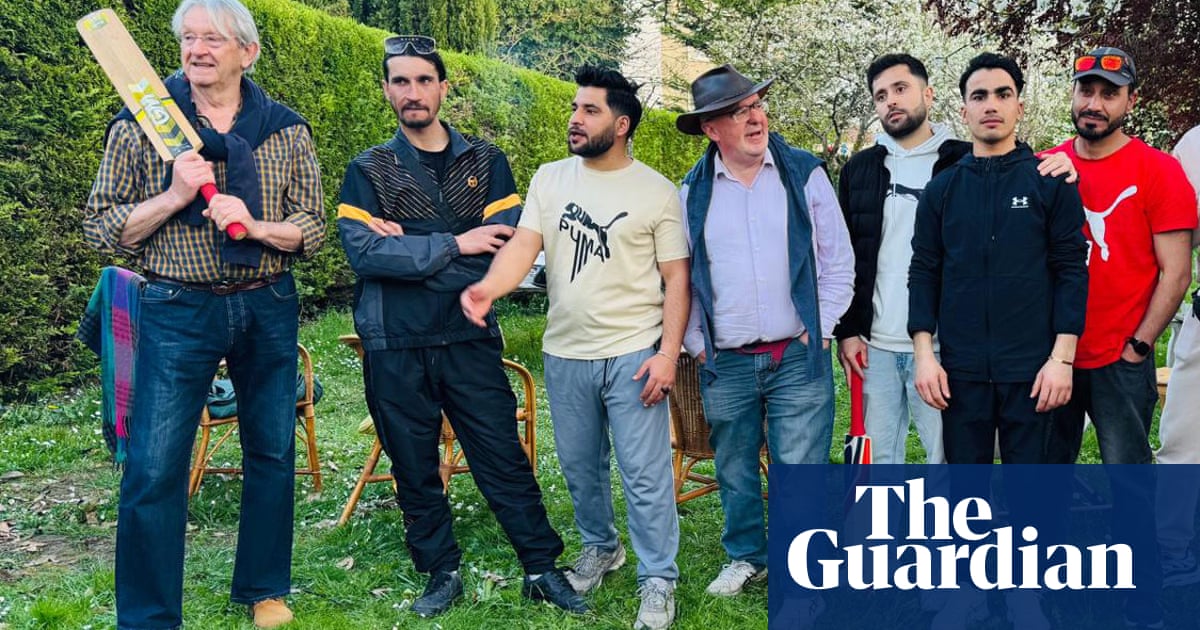Next week in Caen, at a baseball practice ground, on a pitch made out of two pieces of chipboard with some carpet stapled on top, a cricket tournament will unroll. Nine teams of refugees, mostly based in Normandy, will fight it out over two days in a series of round-robin T5 tape-ballgames.
The battles will be fierce, the bowling often fast, with added jeopardy if the ball hits the not-very-well-disguised join between the two bits of chipboard. Chris Drew, a Guardian reader who lives locally, will umpire. “You watch county cricket and there is time,” he says via video call from France. “Time is one thing that you don’t have here. It is hit, it is whack, it is run, it is bowl – it is quite something. When they whack the ball, it stays whacked. There are no defensive shots.
“It’s all about having a good time. People being together who want to be together because we love the game. They leave everything else at the door. I never ask anyone where they come from or what their status is – it’s just about bringing a moment of happiness.”
In 2023, the tournament’s first year, it was sponsored by a kebab shop with free kebabs all round. This year Drew will make Welsh cakes and bara brith and his wife cucumber sandwiches. “Somebody will bring a salad and somebody will bring a chicken – it’s a communal thing.”
The community spirit extends further. Teams do not yet know whether they will qualify for the knockout matches on the second day so players will bring tents, and many will camp in local gardens. “It’s all about mucking in,” says Drew. But there are limits. The bowlers will run in from one end of the ground so the houses lining one side of the boundary do not get peppered with unfamiliar flying objects.
That the players have equipment at all is largely down to another group of volunteers.Project Front Foot(PFF) are a registered charity that collects spare kits from clubs and redistributes it to refugee groups. For the first 10 years of its inception, PFF mostly worked in the Dharavi slum in Mumbai, providing equipment for the children living there. They changed tack shortly before Covid to provide for those closer to home – to Germany, where cricket clubs sprung up overnight with the arrival of 1.5m refugees, France, Portugal, Lebanon and London.
It is a labour of love for the project leader, Vic Mills, and his team. In September, they collect from clubs who have something to donate (often because of a change of sponsor), take three or four days going through it all, number it for customs – who post-Brexit need everything individually labelled – and store it in volunteer Tim Gill’s double garage until March.
Then they unpack it all again, refill the spread sheet, stock the van with the right equipment for the right clubs and get on the road in time for the beginning of the northern hemisphere cricket season. This year there were 48 bags and 13 boxes of clothing and equipment, plus a dozen bin liners of sportswear – more than 2,000 items. They included: 48 bats, 30 wicket sets, 86 pairs of pads, 123 pairs of batting gloves, 15 pairs of wicketkeeping gloves, 35 helmets and 74 caps and sun hats.
“We’ve moved up to the largest Transit that the boys feel confident enough driving,” says Mills. “Many of the county clubs have been extremely generous – with particular thanks to Steve Archer and the YorkshireCricketBoard and the Lancashire Foundation.
“These guys we’re delivering to have nothing, they haven’t got much money or practice kit. We’re finding a home for equipment that would otherwise go to the charity shop or landfill. With a lot of projects, very rarely does all the money allocated get to where it is needed; we can reassure people that we can find a home for pretty much everything.”
Sign up toThe Spin
Subscribe to our cricket newsletter for our writers' thoughts on the biggest stories and a review of the week’s action
after newsletter promotion
On 4 April, the PFF van arrived in Caen and some of the bags were unloaded into another garage, this one belonging to Drew, before a celebratory barbecue for players and volunteers at the house of Caen CC’s president, Julia.
“[PFF] provide us with bats, with pants, with helmets, with jockstraps, everything you could want,” says Drew. “They, like Julia, who is absolutely fantastic, are heroes for providing something for the mental health of these lads.”
Have they had any feedback about the tournament three years in? “The teams want to come back, which I take as a positive sign. There’s a demand, there’s an enjoyment and we’re growing. I’m not saying everything’s perfect. It’s like every cricket club. Not everybody loves everybody all the time.
“But if you come along to the events, you respect everyone else there. The fair play, the spirit of cricket, and that goes outside the bounds of the cricket pitch as well.”
In the current wild and fragmented landscape, there is something comforting in the cricket’s ability to still bring hope and community, as well as grasping around for yet more dollar bills.
If you would like to donate to, or are a club with refugee cricketers who would like a kit donation from Project Front Foot please contact them onprojectfrontfoot@gmail.com.
This is an extract from the Guardian’s weekly cricket email, The Spin.To subscribe, just visit this page and follow the instructions.
